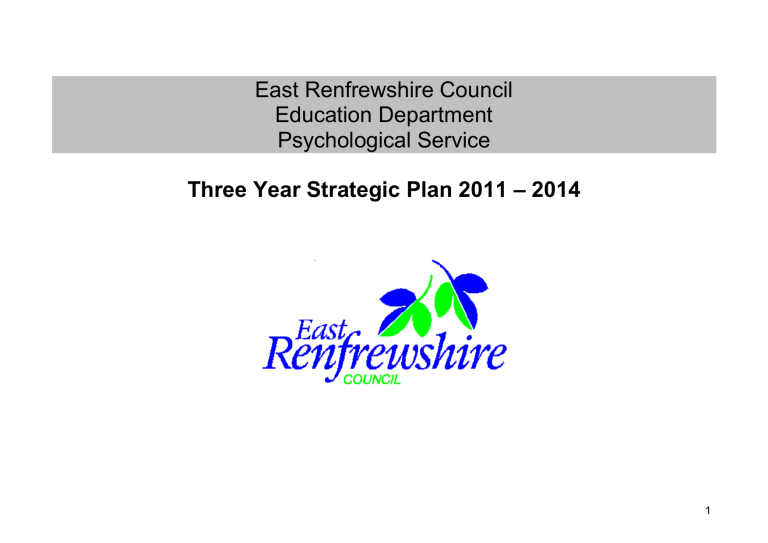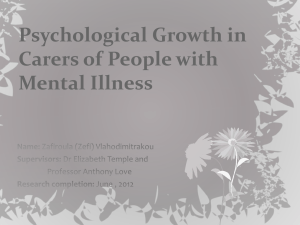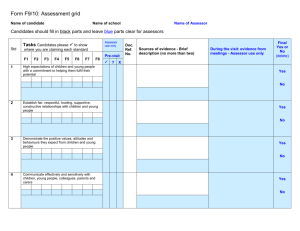Vision - Glow Blogs

East Renfrewshire Council
Education Department
Psychological Service
Three Year Strategic Plan 2011 – 2014
1
Vision, Values and Aims
Vision
East Renfrewshire psychological service is committed to the education department’s mission statement ‘Inclusion .Ambition and progress for All’ and seeks to achieve this by working collaboratively with others to deliver an accessible, quality service focused on improving outcomes and emotional well-being and meets the needs of the individual, the family and the wider community.
The service values:
Child centered approaches
Inclusive practices and attitudes
Evidence based practice
Accountability
Collaborative practice
Excellence for users and practitioners
Parent and pupil involvement
Diversity
Sensitivity and respect
Openness and honesty
Confidentiality
Partnerships
Fairness
Aims
To apply appropriate and effective models of psychology to schools, families, children and agency partners to bring about positive change
To commit to an ongoing process of continuous improvement through self-evaluation and monitoring to ensure quality and effective practice and identify impact and outcomes
To involve service users and partners in planning for service improvement
2
To participate in a high level of collaboration with other professionals in order to ensure effective service delivery at the point of need
To create a framework where practitioners commit to a process of ongoing self reflection and continual professional development
To support the development of psychological research and training.
To promote positive attitudes to social and cultural diversity
To develop services that link to authority and school improvement plans, national priorities and the authorities vision of children being safe, healthy, active, nurtured, achieving, respected, responsible, included.
3
Single Outcome Agreement
Outcome Delivery Plan
Education Local
Improvement Plan
Integrated Children’s
Services Plan
Strategic Service
Improvement Plan
(Three year rolling plan)
Authority Working Groups QIG Action Plans
(One year plan)
Improvement priorities are identified from self evaluation activities as detailed in the Annual
Monitoring Calendar.
4
Target
Broaden the service’s contribution to the implementation of
CfE, particularly in relation to assessment and learning and teaching.
To develop the service’s role in the assessment of micro technology for children with
ASN.
Quality Indicators
Quality Management in Local
Authority Educational
Psychological Services
1.1 Improvements in performance
2.1 Impact on children and young people
2.3. Impact on parents, carers and families
4.1Impact on the local community
5.1Consultation
5.2Assessment
5.3Intervention
5.4 Professional development and training
5.5 Research and strategic development
5.7 Improving the quality of services
6.1Policy development and review
6.2 Participation of stakeholders
6.3 Operational planning
8.1 Partnership working
9.2 Leadership and direction
9.4 Leadership of change and improvement
Link to Local Improvement Plan
I.1 a reduction to zero in the number of young people not in education, employment or training
AC.4 Improved reading, writing and mathematics attainment throughout the years of a broad general education
AC.6 an improvement in the attainment of the lowest achieving 20% of East
Renfrewshire’s school age children
AM.1 an ethos of high expectations and achievements in every school and service
AM.2 a curriculum and services which enable all children, young people and adults to be successful learners, confident individuals, responsible citizens and effective contributors to school, to society and at work
AM.5 a skilled and confident workforce
P.1 a culture based on the belief that all learners, given support and challenge, can achieve high standards
Outcomes / Impact
Increased articulation between service delivery and school improvement planning.
Increased service activity in areas related to assessment and learning and teaching.
The service has clear practice guidelines on the role of the service in the implementation of CfE.
The service is represented on all authority groups related to CfE.
Psychologists report increased confidence in their role in supporting schools with the implementation of CfE.
Stakeholders actively participate in service self evaluation and improvement planning.
The service has developed systems and practices for the assessment of micro technology support for learners with ASN.
Psychologists report increased knowledge and skills in micro technology.
Improved access to the curriculum and engagement in the curriculum for learners with ASN following assessment and provision of micro technology
Monitoring and
Evaluating
Staff meetings
QIG Action Plan
PLA analysis
Quality management reviews
5
Target
Further improve communication methods to parents as well as the quality, range and coordination of services delivered.
Quality Indicators
Quality Management in Local
Authority Educational
Psychological Services
1.1 Improvements in performance
2.1 Impact on children and young people
2.3. Impact on parents, carers and families
4.1Impact on the local community
4.2 Impact on the wider community
5.1Consultation
5.2Assessment
5.3Intervention
5.4 Professional development and training
5.7 Improving the quality of services
6.1Policy development and review
6.2 Participation of stakeholders
6.3 Operational planning
8.1 Partnership working
9.4 Leadership of change and improvement
Link to Local Improvement Plan
I.4 more effective partnership working with other agencies and with the parents of children who are at risk of missing out on educational opportunities.
AC.2 Higher levels of parental engagement in their children’s learning and in the life of the school
Outcomes / Impact
Parents and carers can access parenting information and advice through a range of different communication sources
All parents report that the psychologist actively involves them in decisions that impact on their child
The service actively contributes to the authority parenting subgroup.
More effective partnership working with other agencies results in improved coordination of services delivered to parents.
Parents report increased parenting capacity following intervention from psychological service.
Parents actively participate in service self evaluation, policy development and improvement planning.
The service actively contributes to the development of other educational psychology services.
Monitoring and
Evaluating
Staff meetings
QIG Action Plan
Parenting subgroup
Quality Management
Reviews
6
Target
Strengthen impact on the wider community through increased contribution to the national development of educational psychology services
Quality Indicators
Quality Management in Local
Authority Educational
Psychological Services
1.1 Improvements in performance
2.1 Impact on children and young people
2.2 Impact on parents, carers and families
4.2 Impact on the wider community
5.4 Professional development and training
5.5 Research and strategic development
5.7 Improving the quality of services
6.1 Policy development and review
6.2 Participation of stakeholders
9.4 Leadership of change and improvement
Link to Local Improvement Plan
I.4 more effective partnership working with other agencies and with the parents of children who are at risk of missing out on educational opportunities
AM.1 an ethos of high expectations and achievement in every school and service
AM.5 a skilled and confident workforce
AM.6 a culture of self evaluation and continuous improvement in all schools and services
P.5 resources lead to improvements for learners
Outcomes / Impact
The service is represented on a range of national advisory groups and committees
The service regularly benchmarks with partner educational psychology services as part of their self evaluation activities and improvement planning
The service has a range of methods for communicating its work to partner educational psychology services.
The service has published research in a nationally available journal.
The service contributes to the development of educational psychologists in training.
Self-evaluation processes support and challenge staff to continuously improve upon performance and outcomes.
Monitoring and
Evaluating
Staff meetings
QIG Action Plan
Quality Management
Reviews
7
Target
To further improve service delivery in the secondary sector to improve impact and outcomes for children, young people and their families.
Quality Indicators
Quality Management in Local
Authority Educational
Psychological Services
Link to Local Improvement Plan
1.1 Improvements in performance
2.1Impact on children and young people
2.2 Impact on parents, carers and families
4.1 Impact on local community.
5.1 Consultation and advice
5.2 Assessment
5.3 Intervention
5.4 Professional development and training
5.5 Research and strategic
5.7 Improving the quality of services
6.1 Policy development and review
6.3 Operational planning
8.1 Partnership working
9.4 Leadership of change and improvement.
I.3 a reduction in the incidence of disruptive behaviour which impeded learning and teaching
I.4 more effective partnership working with other agencies and with the parents of children who are at risk of missing out on educational opportunities
AC.2 higher levels of parental engagement in their children’s learning and in the life of their school
AM.2 a curriculum and services which enable all children, young people and adults to be successful learners, confident individuals, responsible citizens and effective contributors to school, to society and at work
AM.6 a culture of continuous improvement in all schools and services
P.4 resources lead to improvements for learners
Outcomes / Impact
Robust and systematic self evaluation information informs service delivery in the secondary sector.
Self-evaluation processes support and challenge staff to continuously improve upon performance and outcomes.
Stakeholders actively contribute to service self evaluation and improvement planning
The service has an evidenced based strategy for improving service delivery in the secondary sector.
Improved service delivery has led to improvements for learners, parents and the local community.
Monitoring and
Evaluating
Self-evaluation documentation
Standards and Quality
Report
QIG Action Plan
Staff meetings
8
Target
Further develop
Post School
Psychological
Service through improving planning and service delivery in colleges
Quality Indicators
Quality Management in Local
Authority Educational
Psychological Services
1.1 Improvements in performance
2.1 Impact on children and young people
2.2 Impact on parents, carers and families
4.1 Impact on the local community
5.5 Research and strategic development
5.6 Inclusion, equality and fairness
5.7 Improving the quality of services
8.1 Operational planning
8.1 Partnership working
Link to Local Improvement Plan Outcomes / Impact
I.1 a reduction to zero in the number of young people not in education, employment or training
I.4 more effective partnership working with other agencies and with the parents of children who are at risk of missing out on educational opportunities
AC.2 higher levels of parental engagement in their children’s learning and in the life of their school
P.1 a culture based on the belief that all learners, given support and challenge, can achieve high standards
P.3 Partnership arrangements which ensure that all pupils experience a smooth transition from pre-five to primary school, from primary to secondary school and from secondary school to further and higher education and to employment
Improved partnership working to support vulnerable young people.
Increased knowledge of the role of the
PSPS within colleges
Improved school leaver statistics.
Increased services delivered to FE sector
The service has formed PLAs with all colleges which clearly outlines the role of the psychologist in the college.
Monitoring and
Evaluating
QIG Action Plan
Standards and Quality report
Staff meetings
Quality management
Reviews
9
Target
Work in partnership with the Quality improvement
Team to develop and deliver CPD to all school staff to further improve the inclusion of children and young people in
East Renfrewshire
Schools
Implement a service advisory group to improve stakeholder contribution to policy development and improvement planning
Quality Indicators
Quality Management in Local
Authority Educational
Psychological Services
1.1 Improvement in performance
2.1 Impact on children and young people
4.1 Impact on the local community
5.4 Professional development and training
5.6 Inclusion, equality and fairness
6.3 Operational planning
7.2 Deployment and teamwork
7.3 Development of staff
8.1 Partnership working
9.3 Developing people and partnerships
2.2 Impact on parents, carers and families
4.1 Impact on the wider community
5.7 Improving the quality of services
6.1 Policy review and development
Link to Local Improvement Plan
I.3 a reduction in the incidence of disruptive behaviour which impedes learning and teaching
I.5 maintain and where possible improve upon the already low number of exclusions from schools, especially for looked after children
AC.7 an improvement in the attainment of the lowest achieving
20% of East Renfrewshire school age children
AM.5 a skilled and confident workforce
P.1 a culture based ion the belief that all learners, given support and challenge, can achieve high standards.
P.2 learners experiences support them to develop their personalities, talents, mental, spiritual and physical abilities to their fullest potential
I.4 more effective partnership working with other agencies and with parents
AC.2 higher levels of parental engagement in their children’s learning and in the life of their school
Outcomes / Impact
All school based staff receive a comprehensive CPD programme and report increased confidence, knowledge and skills in managing behaviour.
Schools report a decrease in disruptive behaviour within schools.
Improvements in pupil behaviour and engagement in learning.
Stakeholders actively participate in service improvement planning and policy development and review.
Stakeholders feel involved in contributing to the ongoing development of psychological service.
Monitoring and
Evaluating
Inclusion working group
Standards and Quality report
Staff meetings
Self evaluation activities
Staff meeting minutes
SMT
Stakeholder evaluation
10
Continue to improve service planning and delivery, including research and development, so that it is more directly related to school improvement planning
6.2 Participation of stakeholders
8.1 Partnership working
9.4 Leadership of change and improvement
1.1 Improvements in performance
4.1 Impact on the local community
5.6 Inclusion, equality and fairness
5.7 Improving the quality of services
6.1 Policy development and review
6.2 Participation of stakeholders
6.3 Operational planning
7.2 Deployment and teamwork
9.2 leadership and direction
9.4 Leadership of change and improvement
AM.1 an ethos of high expectations and achievement in every school and service
AM.6 a culture of self evaluation and continuous improvement in all schools and services
AM.1 an ethos of high expectations and achievement in every school and service
AM.5 a skilled and confident workforce
AM.6 a culture of self evaluation and continuous improvement in all schools and services
Improved articulation between PLAs and school improvement plans.
Schools access and benefit from the wide range of knowledge and skills within the psychological service.
The time allocated to schools clearly reflects their level of need.
SMT
Staff meeting minutes
Stakeholder evaluations
11








